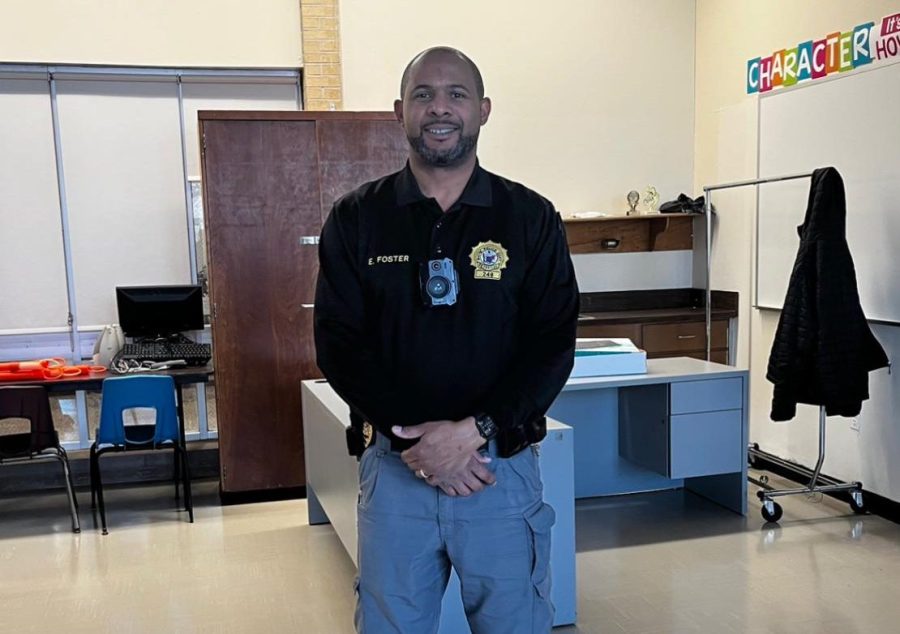Should School Staff Be Allowed to Carry Guns?
December 12, 2022
After high-profile shootings at places like the University of Virginia, Walmart, and Uvalde, questions are rising about whether teachers and staff should be allowed to carry guns in school in order to protect themselves and students from potential threats.
In some states, teachers are already armed. According to an article written by EdSource in August of 2022, it is said that “as of 2018, the last year for which statistics were available, federal survey data estimated that 2.6% of public schools had armed faculty.”
While having staff members carrying guns in school would have been unheard of 10 years ago, in a rapidly changing world, anything is possible. The strategy of carrying guns at school “has become a leading solution promoted by Republicans and gun rights advocates,” but in recent times even some teachers are jumping on board.
Following the events of the mass shooting in Uvalde that left 19 children and 2 teachers killed, Ohio teacher Mandi expressed that she and others “‘just feel helpless,” and that the district-issued emergency supplies are “‘not enough.” Guns, she said, are the next level of protection.
Wayne Hills Senior Ben Prusakowski agreed that he “would feel more comfortable in a classroom with such a weapon because of the safety and protection it would provide against shooter situations. This day and age, I feel like the only way to protect our students from such violent and horrific acts is to resort to clapping back with the glock on the opp.”
The Education Commission of the States is a US interstate agency that tracks educational policy and relays research. In October 2022, the Commission updated its reports on the school staff restrictions for K-12 schools. We can see that there is no universal rule for state gun laws in schools, and every state has its own individual rules regarding the allowance or prohibition of certain aspects of granting staff access to carry guns at school.
Below reads different categories of school staffing across the nation and whether or not they are allowed to carry a gun on school premises. Per review of the statutes, Hawaii does not have specific laws with regard to guns in schools, but the District of Columbia does.
School Security Personnel
Examples of School Security Personnel include police officers assigned to a school, Student Resource Officers, and security officers. Wayne Hills’ Detective Foster is considered part of this category.
Thirty-eight states allow security personnel to possess firearms in school, including North Carolina, South Dakota, and Tennessee. Twelve states do not, including Alaska, Connecticut, Kansas, Louisiana, and New Jersey.
Regular Teachers, Principals, and Staff
These are school employees that are authorized by state statute to possess weapons in school.
Forty-two states have refused the authorization of school staff allowance to possess guns at school, New Jersey being one of them. The eight states that allow staff to possess guns under this authorization are Idaho, Kansas, Louisiana, Missouri, Ohio, South Dakota, Tennessee, and Wyoming.
Concealed Carry Permit Holders
These are people that have permits allowing them to carry firearms in public in a concealed manner. These holders have to be explicitly authorized to be allowed to have guns in schools.
In this category, it is listed that forty-one states say do not allow this authorization, and nine states have approved it. These nine states are Michigan, Idaho, Alabama, Kansas, Missouri, Ohio, Oregon, Utah, and Wyoming.
Districts, Schools, or School Boards
This category of states allows for districts, schools, or school boards to be the ones explicitly allowed to permit guns in school, as opposed to the state.
Twenty-eight states say have approved this authorization, including New Jersey, and 22 have not.
Overall, many states are more lenient than others when it comes to the possession of weapons in school. However, it is not all black and white, where states just say yes and no to having them in school; there are many loopholes.
Wayne Township’s own Board of Education policies regarding weapons must comply with state law, which prohibits the carrying of firearms in school. The opening statement in District Policy 8467 – “Weapons” reads “The Board of Education prohibits the possession, use, or exchange of any weapon in any school building, on school grounds, at any school-sponsored event, and on school-sanctioned transportation except as the possession and use of a weapon is authorized by law and required in the performance of the possessor’s duty.”
Essentially, unless otherwise authorized, guns in Wayne schools are prohibited.
We spoke with Wayne Hills’ SRO Detective Foster to see if his own restrictions and regulations coincide with these claims. Foster is employed by the Wayne Police Department and has been assigned to Hills as a School Resource Officer within the last couple of years. For this reason, Foster is allowed to carry a gun on school premises, however, this rule is not universal and its flexibility (even in New Jersey) is solely dependent on the district and its own policies.
Foster explains that his role as an SRO officer is mainly his presence, as it “deters any criminal action or any stuff that could happen if there wasn’t a police officer here. What I do here mostly is investigations on school property, interact with students and teachers, and make sure the school is secure” (for example, doors, making sure things are locked, etc.).
SROs have been implemented into the Wayne school system since the early 2000s to “have a presence here” said Detective Foster, “that’s one of the main reasons why my office got moved [to the first floor], so I can see whoever is coming in [the school] and everything that is happening.”
Foster did confirm that in Wayne, the Board does not have a say in whether or not staff can carry a gun on school premises, but described that the law is currently “changing and is very fluid.”
While staff having firearms in school may comfort some, however, it does quite the opposite to others. Wayne Hills Senior Yara Shobut expressed that she “would not feel comfortable in a classroom that had a weapon of such kind in it, especially if you don’t know the student you’re next to. This could be a straight gateway to more school shootings.”
Yara also believes that “violence should not be combated with violence and that we have to target mental health resources within the school and make them more accessible,” instead of using guns as a resolution.
Laws and policies pertaining to staff having guns in school vary widely across the nation, and are still not finalized. In a rapidly changing world, it is unknown how the restrictions regarding guns as a safety precaution in schools will change.









Ahmad D • Dec 23, 2022 at 10:06 AM
The reasons provided in this article that support teachers carrying guns are very valid, but this could lead to many legal problems. This would also change high schools for future generations possibly leading to a decrease in the public school populace
Shea Riordan • Dec 23, 2022 at 10:05 AM
It is so unfortunate that this topic even needs to be discussed. But because of the amount of school shootings that occur in the US, this might be reasonable. The staff members would have to go through extensive amounts of training which may be very scary, but it could protect students and the staff members themselves.
Aly L • Dec 23, 2022 at 9:54 AM
I think this article is very interesting and informational. I believe this is a difficult topic to talk about since guns shouldn’t be needed in school, but due to the rise of school shootings in the US, it is something that needs to be discussed. I agree that teachers should do everything to keep their students safe, but at the same time teachers may not feel comfortable with the pressure of using a gun and learning how to use one correctly. It also may make some students feel less safe for multiple reasons. This may be a resolution, but may also cause more problems.
Eric • Dec 23, 2022 at 9:53 AM
Although there are many uses and reasons provided in this article about why it is important for teachers to carry firearms such as the defense of themselves and students, I still think that there could be several problems which may arise from doing this.
Stella Vasilopoulos • Dec 23, 2022 at 9:21 AM
This article was an important discussion in my opinion. I personally have mixed feelings on this. While I do believe with the world we are living in today, having guns in the school would be a smart move, I also don’t think teachers should be required to know how to use a gun or to have a gun. It’s not something any teacher signed up for when they became one and I don’t think they should have to do that now. I’m very in between on my stance on this.
Kayla • Dec 23, 2022 at 8:43 AM
I thought this was a really interesting article!